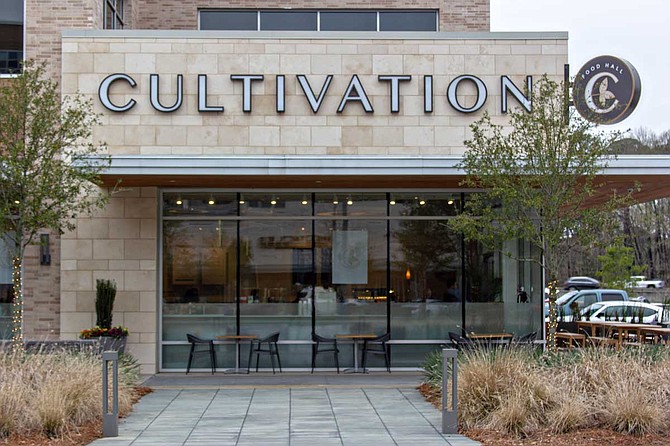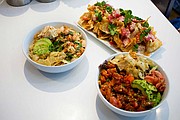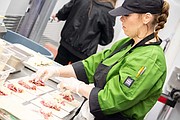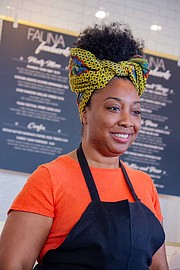After months of promotion, Cultivation Food Hall finally opened in January 2019. Photo by Acacia Clark.
Ariella's NY Delicatessen owner Alivia Ashburn-Townsend stands near the end of the curved white marble countertop talking to one of her staff members. Poke Stop owner Rachel Phuong Le stops quickly to say something to this reporter, and then rushes to her cash register once a couple of customers walk up to her counter. At this point in the afternoon, Cultivation Food Hall has finally reached the usual 2 p.m.-to-4 p.m. lull that most restaurants experience, though people are still trickling in, sometimes in moderate bursts. After ordering at their chosen restaurant, some guests sit together at communal tables or at high-topped ones, perched on tall chairs. Some pull up to the Gold Coast Bar as they chat, eat and drink.
A food hall is similar to a food court in a mall, except that it places an emphasis on small, local businesses. Though the din of chatter is ever-present at Cultivation—like it is at most mall food courts—the venue has a different feel. The food hall exchanges the familiar upholstered booths and small, square tables for long, white communal versions, a few round high-top ones and wooden chairs with gold framing. On the ceiling, A+ Signs and Creative installed the word "CULTIVATION" in lit-up letters.
Along with Ariella's and Poke Stop, the food hall has a coffee shop, il Lupo, the aforementioned Gold Coast Bar, Whisk Creperie, Fauna Foodworks, Local Honey, Fete au Fete StreEATery and Bocca Pizzeria.
Something else sets Cultivation apart: women-owned businesses. Of the nine businesses there, women have full ownership of four—Ariella's, Poke Stop, Fauna and Whisk—and co-own il Lupo and Bocca Pizzeria.
"It's a great community to help other women support other women-owned businesses," says Cultivation Assistant General Manager Eliza Wilson. "They all work together really well and support each other in any way that they can. It really gives a feeling of camaraderie, not just in the women-owned businesses, but in all of our businesses that are owned here. But there's definitely that sisterhood in those women-owned business."
Sharing a New Cuisine
Food halls are familiar to Le, a Long Beach, Calif., native. "I love the food-hall culture," she says. "I'm from California, so every few miles, there's a food hall or a place that has 10 different restaurants in one little corner, in one little building."
When Le heard about Jackson's foray into food halls in 2017, she knew she had to be a part of the concept. Cultivation announced her business, Poke Stop, during the first wave of vendor reveals in April 2018.
As you can tell from the name, Le's restaurant serves poke, a dish that gets its origins from Hawaii.
"I feel like Jackson would need something different," she said about why she chose to base her business around the dish. "But we need something that is also healthy, that can cater to a lot of different diets."
The dish's name means "to cut crosswise into pieces" in Hawaiian. In pre-colonial, Polynesian Hawaii, people would catch fish, slice it, and toss it with sea salt and seaweed. The dish evolved from there, and today's version basically breaks down to deconstructed sushi. To this day, poke remains a staple in Hawaii.
"Basically, you get to customize your own bowl," Le told the Jackson Free Press in May 2018. "It's like doing your own sushi roll, but instead, it's deconstructed sushi rolls in a bowl. It just makes it easier to eat. That's how they do it in Hawaii."
Despite being new to owning a restaurant, Le says the opening process was fairly smooth. Early on, she worked with General Manager Patrik Lazzari, who owns Bocca Pizzeria with his wife, Cristina Lazzari, and Jonathan Shull, who worked on brand development for Cultivation, on bringing her idea to life. But it was scary, she said.
"You don't know how people are going to take something new here because I don't know how open everybody was going to be for poke," she says. She is finding out now that some people may not understand poke, but "that's why I have signature bowls to kind of introduce them to it, and now they keep coming back and coming back," she says.
The restaurant is popular; at any given moment, there could be anywhere from three to 10 or more people waiting in line to try one of Le's creations. "The support has been so overwhelming," she says.
On top of being a business owner, Le is an admin for the "Eat Mississippi #tricountyfoodies" Facebook group and "Asian Cuisine Foodie Group," and a member of the "Jackson Foodies" group. But she doesn't just like to eat; she also loves to cook and share food, a habit she developed while growing up when her family would order everything to share. That sharing extends to getting people to try different cuisines, and Poke Stop is part of that.
"That's my way of reaching out and saying, 'Let's share something different,'" Le said.
Le, Ashburn-Townsend and Fauna Foodworks owner Enrika Williams are all new business owners. Over the last few months, they have created a trio of sorts, leaning on each other for support.
"When you first learn how to walk," Le says, "it's really hard, it's difficult, but what I have here is a really good support system, especially from the ladies."
Williams and Ashburn-Townsend will often help Le with the food, and with Ashburn-Townsend's accounting background, she often steps in to help Williams and Le with the business side of things.
"They're so bombarded just by the operations of a business that they (may not) know these things, and that's where I come in, like, 'Hey, y'all don't forget you've got to do this,'" she says.
From New York to Jackson
Ashburn-Townsend and Williams came during the second wave of announced vendors, with Williams becoming one in October 2018, and Ashburn-Townsend getting involved in November.
"I had very little time, like 30 days, to start an entire concept," Ashburn-Townsend says. "I was definitely stressed out to the maximum capacity opening (the restaurant)."
Though she had to move quickly for the restaurant's actual opening, the idea had been in the works for about a year. In early 2018, Ashburn-Townsend polled the tri-county foodies group members on what kind of food they'd like to see in Jackson.
"What's the one meal you wish you could find within the tri-county? I got a plan," Ashburn-Townsend wrote.
Out of the people who commented, New York-style deli was a common theme. In making plans to open a restaurant, Ashburn-Townsend said that idea was not on her radar. At least at first.
"I wanted to be able to show my culinary side and let people see what I was capable of doing," she said. "... But (a New York deli is) what the people wanted. This is supply and demand. I knew I could execute it very well, so I ran with it because at the end of the day, it's about, 'What do they want? What are they going to support?'"
She does get to showcase her culinary skills, though, through the daily specials. On the day of the interview for this story, Ariella's had a pastrami burger on a challah bun. She has also crafted specials such as Reuben eggrolls with corned beef, sauerkraut and Swiss cheese; and corned beef hash cakes with a spicy mustard aioli.
After Ashburn-Townsend got the idea from the foodies, she began researching authentic Jewish delis in New York City. She had visited in May 2015, so she had at least experienced the environment.
"It's very upbeat, very fast-paced," she told the Jackson Free Press in December 2018. "The vibe in it is just positive, and it just moves, and it's entertaining. ... If you're not ordering quick enough, they have something jazzy to call you. They'll call you a putz. They'll call you a schmuck if you ask for mayo on your pastrami."
In wanting to make the menu as authentic as possible, she also consulted with Leah Dubin, a member of the local Jewish community, and connected with people at Beth Israel Congregation.
"This is their history," she said in December. "This is their cuisine, and I wanted to represent them well."
The menu includes deli staples such as frankfurters with sauerkraut, grilled onions and spicy brown mustard, and the Jewish staple matzo ball soup. She also has dishes with an Italian flair such as the prosciutto Italiano with cream cheese, basil, garlic and sun-dried tomatoes.
In opening the business, she said she had so little time that she could not overthink things.
"I was so busy and consumed by making sure that everything was done exactly the way that it needed to that I didn't have a whole lot of time to stress," she says. "I think that has worked in my advantage."
Nostalgic Inspirations
Williams' journey as a chef took a long, winding route. While growing up in West Point, Miss., she was always surrounded by food. "I had always been exposed to food," she said. "I had always had some type of involvement in food. It's just always been a part of my family, community."
At a young age, she began collecting cookbooks and watching cooking shows.
"It was just kind of something that I've always enjoyed doing," Williams says.
She graduated from the Art Institute of Atlanta in 2004 and lived there until 2010, when she moved to Jackson to help Craig Noone, Jesse Houston and Ryan Bell open Parlor Market in downtown Jackson. After that, she traveled around the country and the world, honing her skills as a chef.
She said her inspirations for Fauna Foodworks came from her imagination and whimsy, nostalgia and from food she has tried during her travels.
"My take on it is 'global street food,'" she says, "just kind of Bohemian-chic in a way, so it's not just typical street food from a food truck. (It's) just kind of putting the spin from my formal training, things that I've picked up. It's a mashup of all of that."
The name comes from the word fauna, which is a book or other work that lists or describes animals of a particular region.
"I'm always fascinated by nature and how things correlate to all of us," Williams says. "I consider us to be animals, so my thing was 'How can I incorporate the things that I've learned and bring in the commonality of wherever I've been?' Food has been that common theme."
It's been a long time coming, though, even if the plan itself was not concrete until 2018. "I think in the grand scheme of things, I have always been preparing for this moment to open my own space," Williams says. "From a young age, I was collecting recipes, always researching things, looking for things, finding things, being inspired by things."
Jonathan Shull first reached out to Williams about Cultivation through Facebook after he saw her post about an article in Shape magazine that features Carla Hall's cookbook, "Carla Hall's Soul Food," in which Williams is featured.
Shull and Williams knew each other from her Parlor Market days.
"He saw the article, and he inboxed me, and he's like, 'Hey, why didn't I think of this before?' ... He pitched this to me about what was going on. I knew exactly what a food hall was because I was living in New Orleans, and there are several food halls there."
Initially, Williams decided to meet with the staff at Cultivation and give them a rough idea of what she wanted to do.
"They loved it, and we just went from there," the chef says.
The menu at Fauna Foodworks is largely vegetable-based, but it's not necessarily geared for vegetarians or vegans, she says. "What it is for me is just taking things that typically you wouldn't find on a menu and just putting a spin on it," she says. "... I thought about things that friends of mine who don't eat meat and things that they would enjoy, and things that meat-eaters would enjoy, even without making it into a thing of 'This is vegan; this is gluten-free; this is whatever.' It's just food."
Williams saves meats for her specials, where she showcases her skills and creativity. Recently, her specials included a beef chili with kidney beans, crispy cornbread oysters, cheese nibs, cheddar and spicy ketchup over rice; and shrimp taquitos with chipotle salsa.
The managerial, logistical and administrative sides of the business were daunting for Williams, a chef focused on creativity.
"It's very tedious, and there's deadlines and things like that, and my mind and my process is more poetic in the sense of being a creative," Williams says of the business.
In an effort to create balance between the two sides, she has had to relinquish some duties to other people.
"I can't do everything," she says.
The entrepreneur often has a creative vision, she says, but still has to hire people and have people around who "may know more than you in some instances so you can build a better team."
Though the entrepreneurs at Cultivation Food Hall had to deal with a lot of the issues other business owners deal with, the hall team takes care of the equipment, point-of-sale systems, hours of operation and management of the facility.
"The startup is relatively low," Williams says. "... [I]t's almost in a sense where it helps you to focus on the thing that you want to focus on to build your brand, or to build your business."
The Business Side
At the food hall, the vendors pay a percentage of their sales to cover rent, utilities, and basics like glassware and equipment such as ovens and fryers. Other than that, though, they are a free-standing business.
"We do a lot more than just give them a space to have a location," says Assistant General Manager Eliza Wilson. "We help them in any way that we can get to that point where they can have their own restaurant."
Whisk co-owner Cristina Lazzari is no stranger to owning her own business. She and sister Alejandra Mamud started La Brioche Patisserie in Fondren in 2014. The two added a second location at the Mississippi Museum of Art in 2018, and now they own Whisk at Cultivation.
Lazzari is also a co-owner of Bocca Pizzeria, along with her husband, Patrik Lazzari, and chef Austin Lee.
She says her ownership is in name only, though—Patrik directs all operations of the pizza restaurant.
Lazzari says the food-hall concept makes starting a business a little easier because half the work is done. "... You can concentrate on your actual food product and being creative, and once you actually feel more comfortable, then you can think about maybe a brick-and-mortar."
The location right off Interstate 55 North Frontage Road is also an advantage, Ashburn-Townsend says. With it being at The District at Eastover, it is surrounded by banks, businesses, upscale residential apartments and more—all potential customers.
"You use that to your advantage," Ashburn-Towsend says. "Anybody that I would give advice coming here is, 'Don't focus on the money. Focus on building the brand. Focus on building a personal connection with your guests.' That's what you're going to win with here. Ultimately, if they'll come here to support Ariella's in a packed parking lot, have to fight a crowd and everything, they'll support you at a brick-and-mortar."
For more information about Cultivaiton Food Hall (1200 Eastover Drive), visit cultivationfoodhall.com.







Comments
Use the comment form below to begin a discussion about this content.
comments powered by Disqus